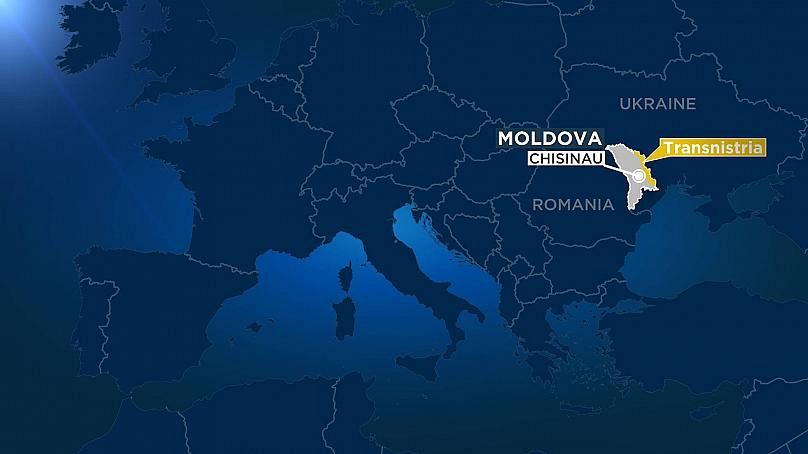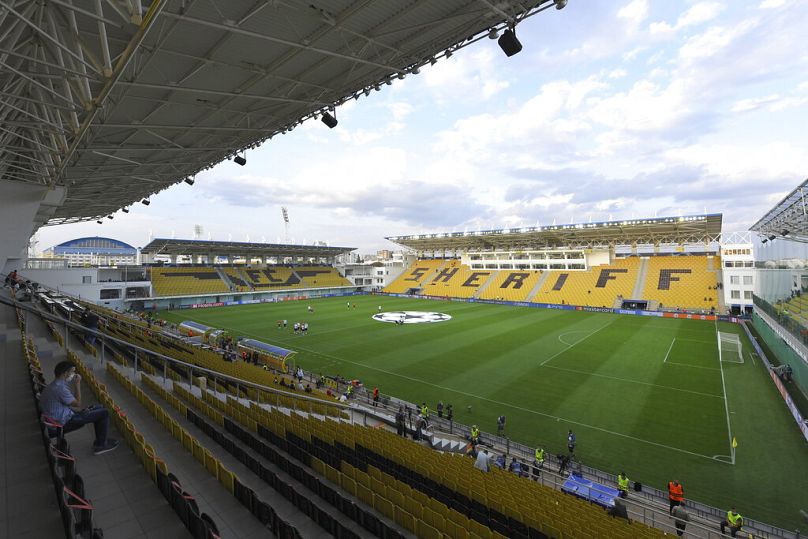Sheriff Tiraspol is up against the might of Real Madrid on Tuesday.
When footballing minnows Sheriff Tiraspol go face-to-face with Europe's most successful team tonight, you could forgive its players for having an inferiority complex.
 ADVERTISEMENT
ADVERTISEMENT
 ADVERTISEMENT
ADVERTISEMENT
Sheriff, from the breakaway region of Transnistria in Moldova, is playing in the Champions League for the first time this season. Its opponent on Tuesday evening, Real Madrid, has won the prestigious tournament a record 13 times. A year after Sheriff was founded in the late 1990s, Madrid was clocking up its sixth European Cup or Champions League title.
Yet, while Sheriff is a small player on the European stage, back home it is a big deal. In the club's 24-year history, it has dominated domestically, winning the Moldovan championship 19 times, ten Moldova Cups and seven Super Cups.
But with the club's success has come questions about the motivation of those backing the club. Are they motivated purely by sporting ambition or is the goal to combine achievements on the pitch with deeper political aims?
"It is soft power proposed and strongly recommended by the Russian Federation, which it wanted and continues to persevere in persuading Moldova to recognise Transnistria as the subject of a potential federation," former diplomat and political analyst Igor Munteanu told Euronews.
A short history of Transnistria
Moldova, wedged between Romania and Ukraine near the Black Sea, declared independence from the Soviet Union in 1991.
Transnistria, a narrow strip of land near Ukraine, split from Moldova a year later after a brief conflict between pro-Russian separatists and the Moldovan army.
The region is now split more or less into three equal minorities: Ukrainians, Russians, and Moldovans and in some cases have four passports, Ukrainian, Russian, Moldovan, and Romanian.
Around half of those who live in Transnistria have Russian citizenship and its government is close to Moscow.
Russia has between 1,500 and 2,000 soldiers in Transnistria, ostensibly as peacekeepers, and the status quo remains one of central Europe's longest "frozen conflicts".
That suited Moldova and the Kremlin over the decades of mostly pro-Russian leadership, but the recent election of a pro-European president with a parliamentary majority -- the first in Moldova's history -- raises the prospect of a change of tack when it comes to Transnistria.
Chisinau has been pushing for the withdrawal of Russian troops from Transnistria for years. Moscow argues the withdrawal of its troops will rekindle the war between Moldova and pro-Russian separatists in Transnistria.
There's a new Sheriff in town
Sheriff Tiraspol was founded in 1997 and went on to achieve unprecedented success.
The club is owned by the local oligarch Viktor Gushan, a former KGB officer close to the Kremlin and the local secessionist elites. He controls Sheriff's holding company, which owns all the important businesses in the region, ranging from supermarkets, gas stations, caviar, textiles to communication and cryptocurrency business.
Gushan has been a successful businessman in the last three decades, spreading his business in Ukraine with the telecommunication company Interdnestrcom, **which was allegedly spying for Russia, according to RISE Moldova.**In 2015, Interdnestrcom was allowed by Russia to operate in the annexed peninsula of Crimea, the investigative journalism project added.
"Viktor Gushan is a former military and KGB man himself and, with a Russian passport, is a hardcore proponent of Rusky Mir [Russian worlds] with Transnistria as one of its centres," Mihai Isac, a Moldovan political expert told Euronews.
"The football club is involved in different actions designed to promote the relations between Transnistria and Russia. Sheriff's conglomerate controls de facto all the region, sometimes nicknamed the Republic of Sheriff."
Sheriff's holding company also has political links, according to Isac.
"The ruling party, Obnovlenie, is considered the political arm of Sheriff. Moreover, the Russian military in the region and the paramilitary forces of Tiraspol authorities have significant contracts with different companies affiliated with Sheriff's conglomerate," said Isac.
Sheriff football players regularly participate in different public manifestations of the Russian military in Transnistria, he added.
"Therefore, it [the club's success] is a considerable PR impulse in this region," he added.
Champions League debut is a 'miracle'
For fan Toma Blanaru, 26, the idea of his team playing the likes of Real Madrid is a dream come true.
"I have been watching Sheriff's matches since 2006," he said. "Fifteen years have passed since then, during which time I dreamed that Sheriff would reach the Champions League groups. Now they managed this miracle, eliminating, in turn, the champions of Albania, Armenia, Serbia and Croatia," he told Euronews.
Toma added he was amazed by the team's style of play - "aggressive pressing, long-range shots, dominating their opponent".
"Moldovans have a unique opportunity to watch top clubs live, such as Real Madrid, Inter Milan and Shakhtar Donetsk," said Toma.
The club's debut in the Champions League group stages is expected to bring in €17 million.
"It is a big financial plus because, besides the Sheriff's performance, the other Moldovan clubs will also benefit from significant amounts of money from UEFA solidarity," said Moldovan sports journalist Sandu Grecu. "We consider the success of Sheriff as a success of Moldovan football."
But others point to the scarcity of Moldovan players among Sheriff's key players as evidence that it is more of a celebration for Transnistria.
"It is known in Moldovan football that Sheriff is a phenomenon exploited by the pro-Russian media in Transnistria or Moldova," said Isac. "Therefore, any success is presented as the success of Transnistrian football and, by extension, Russian football."
Euronews contacted Sheriff Tiraspol to comment on this article but the club had not responded by the time we went to press.
Every weekday, Uncovering Europe brings you a European story that goes beyond the headlines. Download the Euronews app to get a daily alert for this and other breaking news notifications. It's available on Apple and Android devices.












